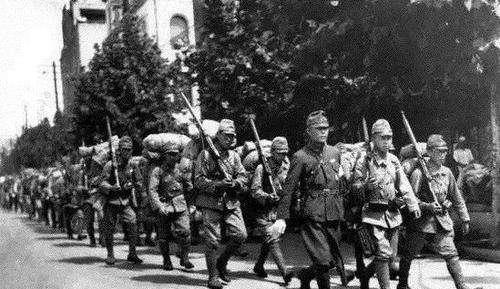In recent history, japan before the Meiji Restoration was only a closed and backward feudal country, but after a revolution, this eastern island country quickly became a powerful industrialized country. As its national and military power increased, the ambitions of this small country to expand gradually expanded. Through the victory in the Russo-Japanese War, Japan expanded its power to the Kanto Prefecture and part of the northeast railway right of way, and gradually began to invade the land of China.
In September 1931, the Japanese army suddenly launched an attack on the North Camp of Shenyang, occupying Shenyang in only one night, and then all three eastern provinces fell. The Japanese-backed puppet Manchu regime was established in March of the following year, and from then until 1945, the Japanese occupied Tohoku for fourteen years. It was not enough to occupy the land, the Japanese also had to mentally brainwash the people of the northeast, they had already begun to enslave the local people before the establishment of the puppet Manchus, and after the establishment of the establishment, various strategies reached their peak, such as forcibly instilling imperialist ideas and learning the so-called "Imperial People's Book".

In order to make the Tohoku more acceptable to Japanese culture and living habits, the Japanese also transferred a large number of Japanese from the mainland to live in the Tohoku, including 120,000 women. These women were in fact victims of militarism, forced to leave their homeland and sent by the Japanese army to settle in the northeast, many of whom were forced to marry northeastern men, and became instruments of colonization by the invaders in the japanese conspiracy to strengthen control of the northeast through blood assimilation.
After occupying the northeast for a few years, the Japanese army launched an all-round aggressive operation, and at first due to the relatively large disparity between the enemy and our forces, the Japanese and the Kosovars repeatedly won victories on the land of China, but the evil war would eventually fail, and after eight years of bloody struggle by countless soldiers and civilians, our country won this difficult battle.
In August 1945, the Japanese Emperor announced his surrender by radio, and the whole country celebrated, but how did they feel when the sound of the broadcast reached the ears of Japanese women living in Tohoku? At the same time, in the face of Japan's defeat, where will their fate go?
After Japan surrendered and withdrew from the Land of China, a large number of Japanese women who settled in the northeast became outcasts of militarism, and they were unsurprisingly abandoned. It is no wonder that Japan was reluctant to mention this issue later.
However Chinese people love peace, and the arrogance of the great power always repays the grievances with virtue, so many women who have nowhere to go are eventually helped by the local residents, many Japanese orphans are adopted by well-wishers, and many Japanese women marry locals and thus spend their lives in China.
For example, in the countryside of Shaanxi, there was an old woman named Wang Yulan, whose real name was Hideko Mizusaki, who was one of the large number of women who were sent to the northeast at that time, and she stayed in China after the defeat of Japan. After that, in order to survive better, she chose to find a Chinese husband to live with, but her life was bumpy, and several marriages did not last long, until she met her fourth husband at the age of 47 and lived a stable life.
In his later years, the elderly Wang Yulan once returned to his hometown in Japan after more than half a century of separation, but with the passage of time, everything has already undergone earth-shaking changes. Hurriedly returning to her hometown, hurriedly parting, with a sense of satisfaction, or a little regret, soon after returning to her hometown, she returned to China, after all, she had lived here for more than sixty years, and everything she had was in this strange country.
For example, the well-known writer Yan Geling has a novel, called "Little Aunt Tatsuru", which was later adapted into a film and television drama, telling that after the end of the War of Resistance, a Japanese woman named Tatsuru was stranded in the northeast, dying of injuries when fleeing, and was finally saved by the local residents, and then spent a lifetime in the northeast.
It is said that after the establishment of diplomatic relations between China and Japan, many of the Japanese women left behind were afraid and disappointed by the militarism of that year, so they stayed in China. After all, for these women, they came to China when they were very young, and have lived in the northeast or other places for decades, their living habits are almost the same as those of the Chinese, and they have always spoken Chinese, so compared with their hometown, China is more cordial and familiar.
Besides, even if they return to Japan, it is estimated that they will not have a home, so it is not surprising that they finally chose to stay.
War is cruel, it hurts not only the people of a country, these abandoned Japanese women are also victims of war and militarism, so the Japanese ultimately choose to tolerate and accept, which is the arrogance of a big country.